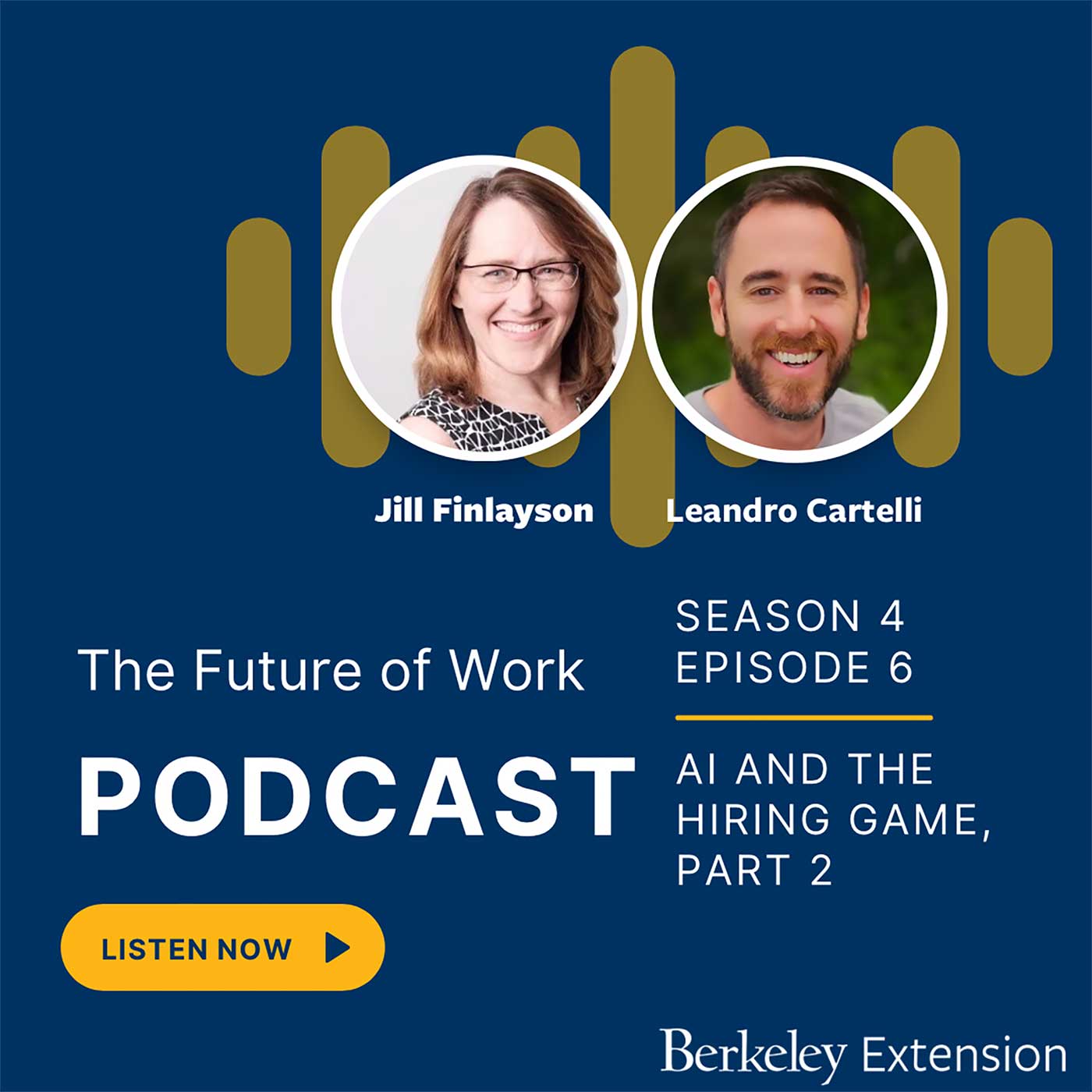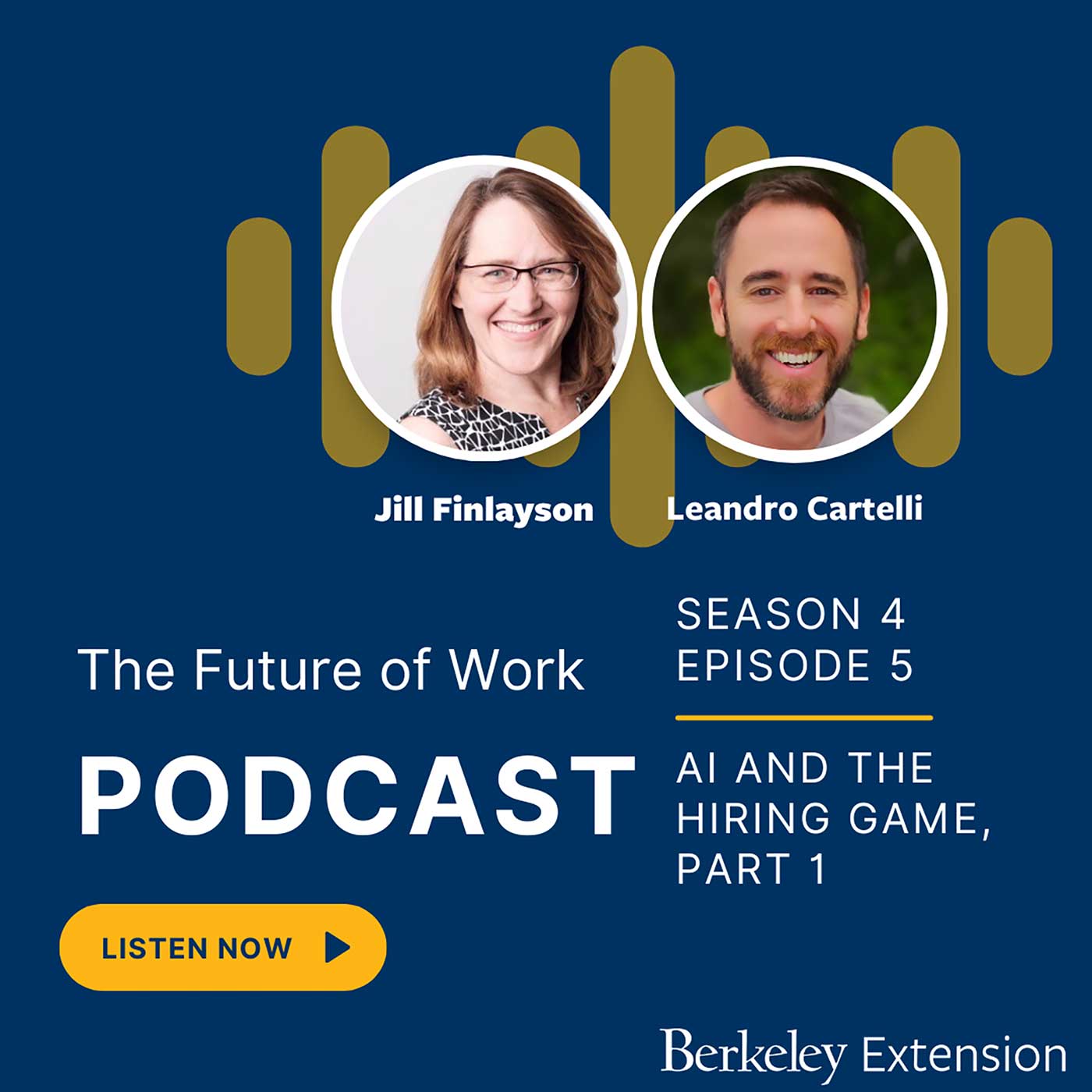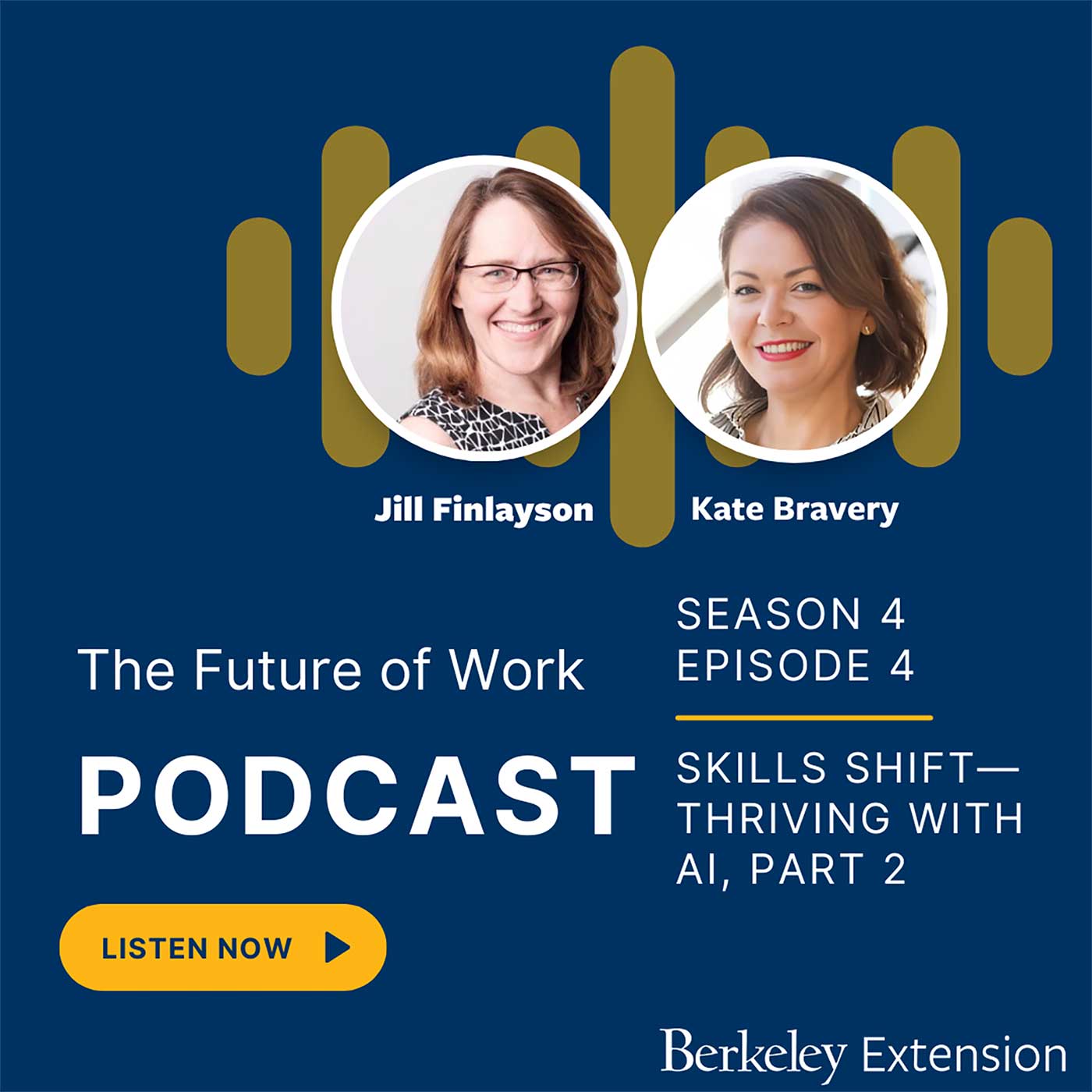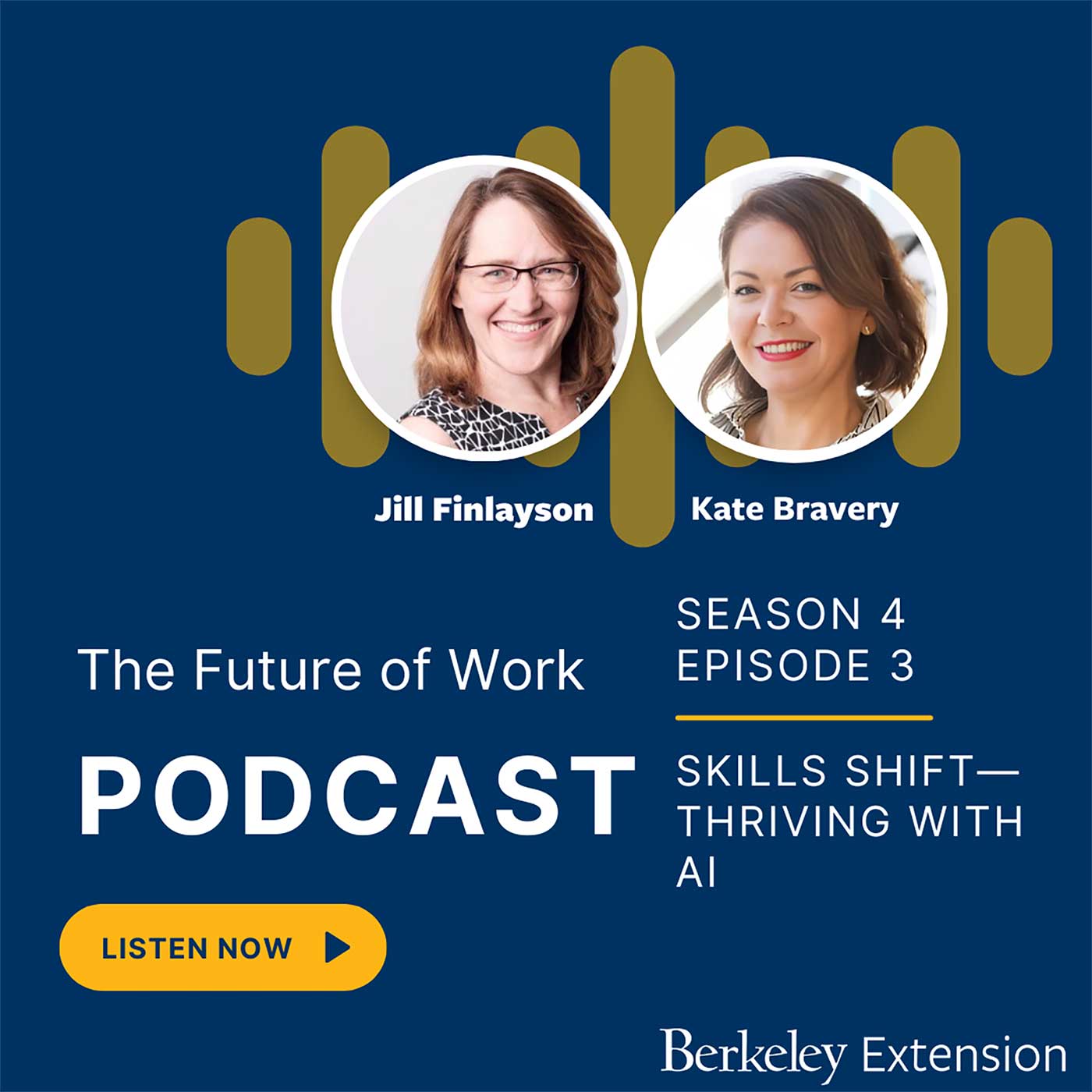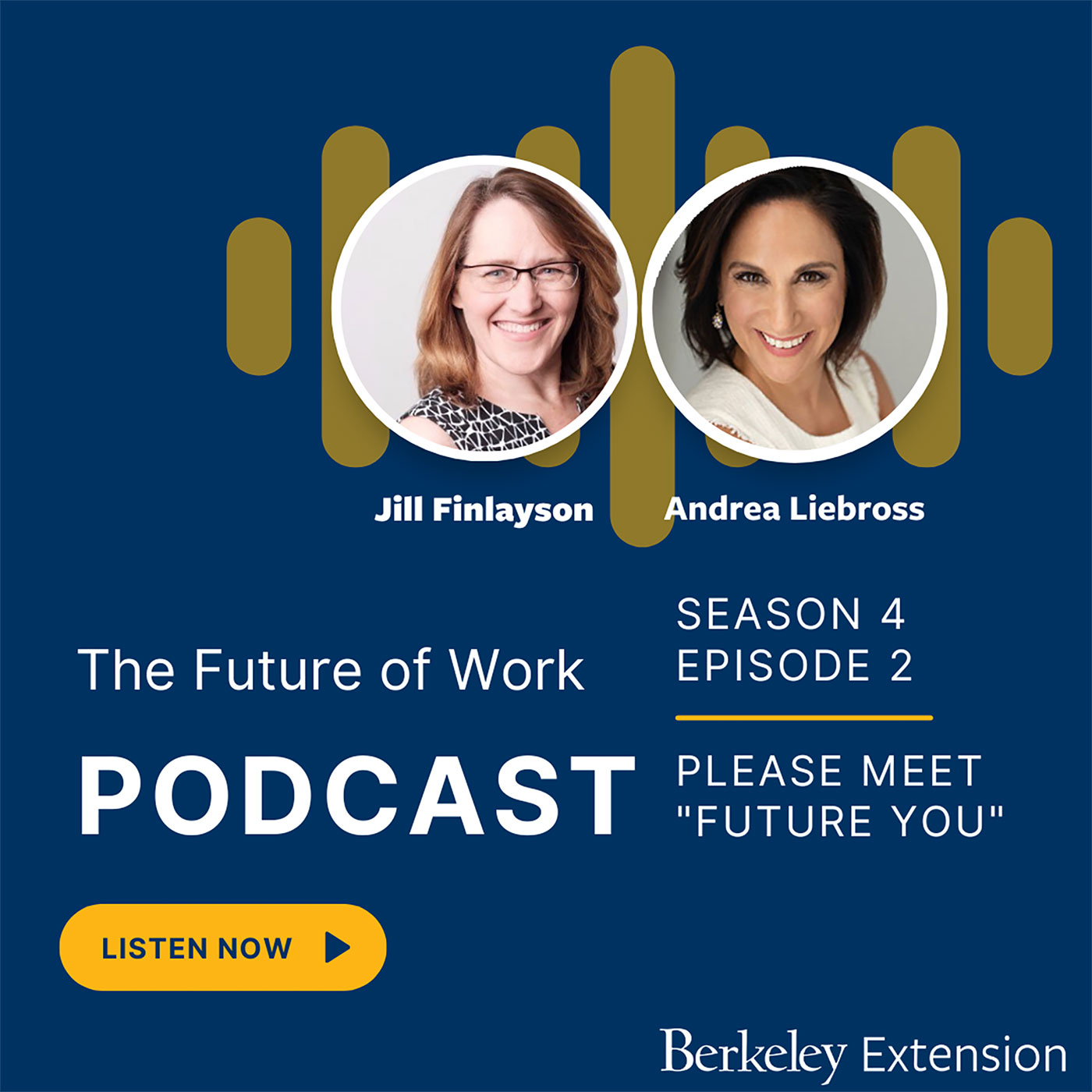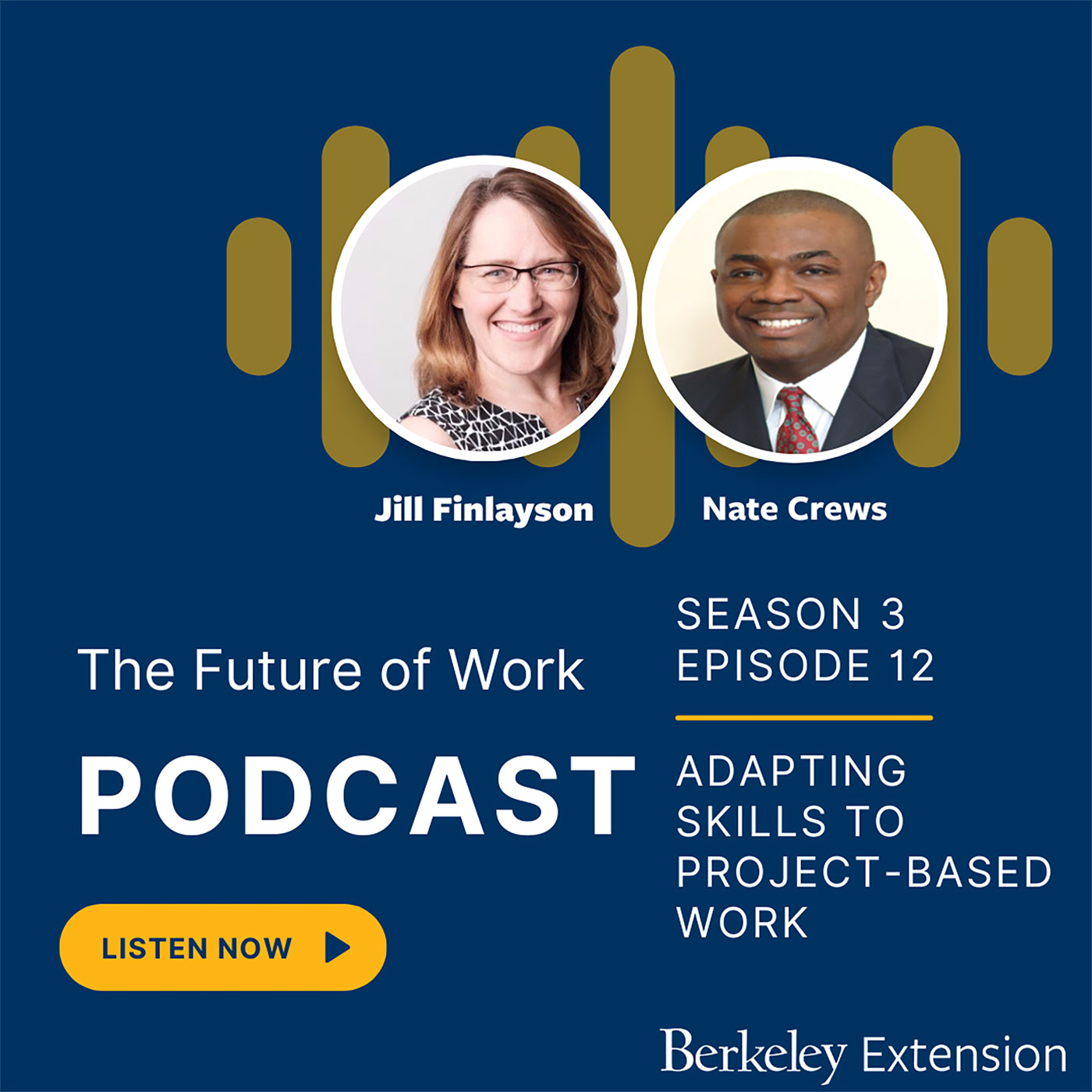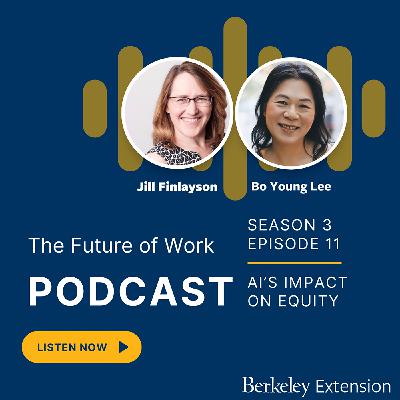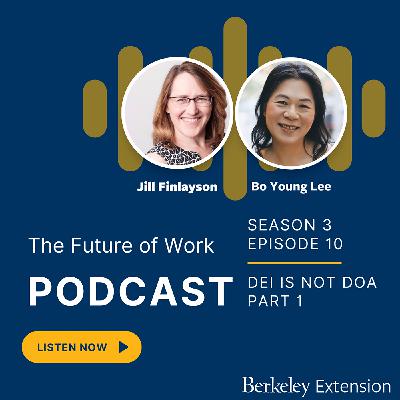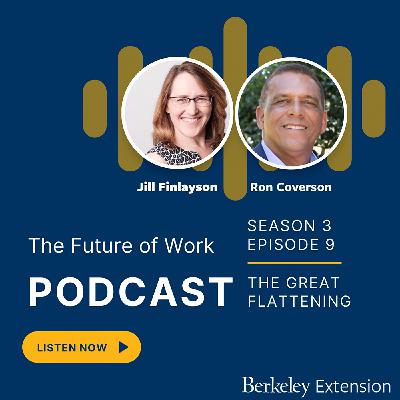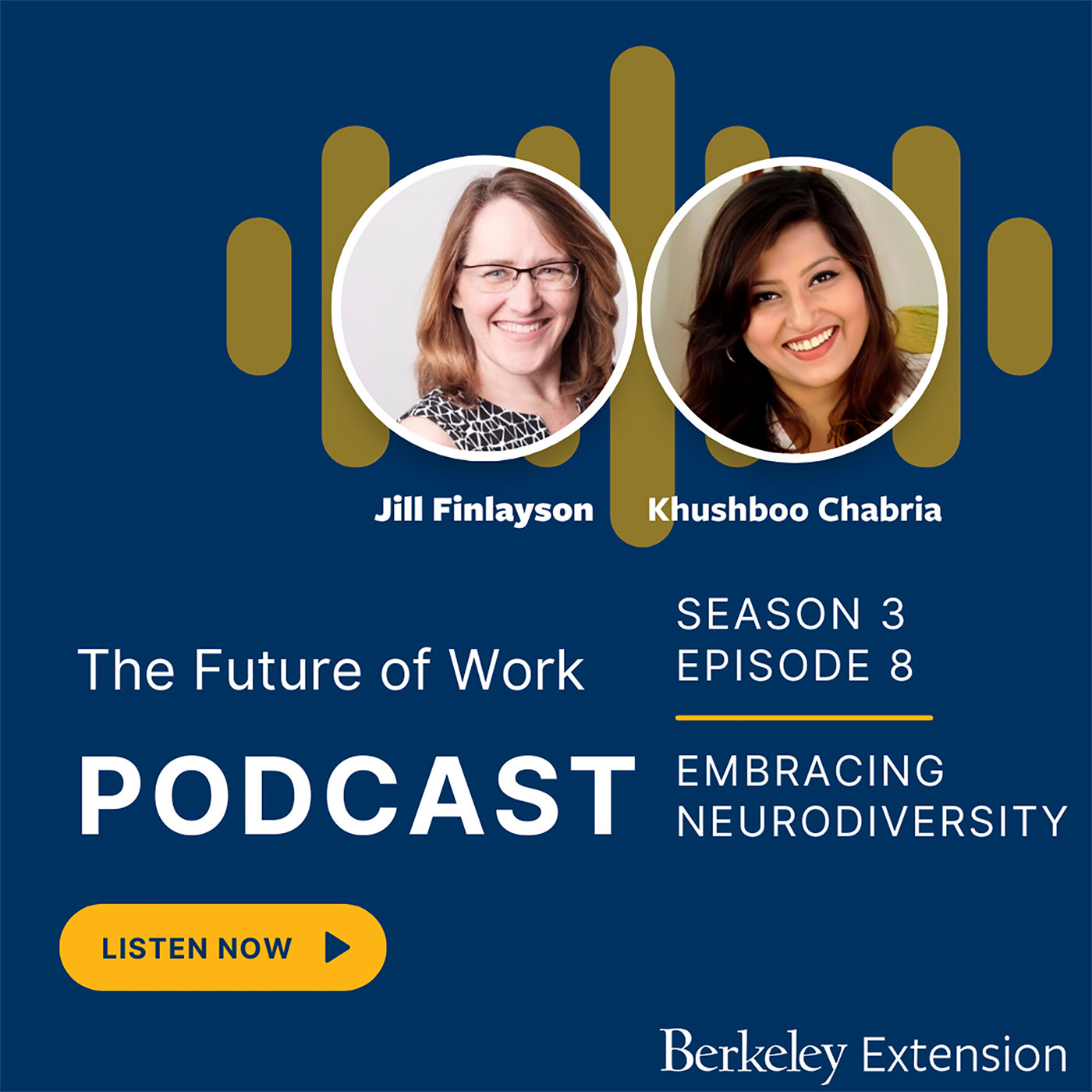Discover The Future of Work
The Future of Work

The Future of Work
Author: UC Berkeley Extension
Subscribed: 6Played: 81Subscribe
Share
© 2024
Description
Even before the COVID-19 pandemic hit, the way we worked and the skills we needed to succeed in our respective fields was shifting. Increased reliance on data to inform business decisions. The automation of job duties that made some workers redundant. The value of incorporating sustainability into everyday processes on the bottom line.
And then COVID-19 shut down the world. Racism and inequalities came to dominate every conversation. And as companies grapple with DE&I initiates and engage with a remote workforce, the way we work today looks drastically different than from just a few years ago. What trends, skills, initiatives and equity will we face in the years to come? Each month, we talk with industry leaders in their fields to discuss the changing evolution of the workforce and the skills needed to stay competitive.
And then COVID-19 shut down the world. Racism and inequalities came to dominate every conversation. And as companies grapple with DE&I initiates and engage with a remote workforce, the way we work today looks drastically different than from just a few years ago. What trends, skills, initiatives and equity will we face in the years to come? Each month, we talk with industry leaders in their fields to discuss the changing evolution of the workforce and the skills needed to stay competitive.
42 Episodes
Reverse
This month, we continue our conversation about AI's impact on recruitment and rewriting the rules of hiring. With hundreds of resumes for every role and too few recruiters to review them, algorithms now decide who makes it through the virtual and actual door. It's efficient—but also impersonal. Candidates are ghosted, culture gets reduced to keywords, and the job search feels like a numbers game or playing the lottery where the odds are stacked against you. And even if you make the first round, it feels more like a transaction than a conversation. To talk about this, we're delighted to welcome Leandro Cartelli, founder of a staffing and recruiting agency specializing in connecting U.S. businesses with top Latin American talent. Read the transcript @https://bit.ly/3JE28xs Learn more about UC Berkeley Extension @https://bit.ly/4i6uptm
This month, we're looking through the eyes of recruiters to see how AI is rewriting the rules of hiring. With hundreds of resumes for every role and too few recruiters to review them, algorithms now decide who makes it through the virtual and actual door. It's efficient—but also impersonal. Candidates are ghosted, culture gets reduced to keywords, and the job search feels like a numbers game or playing the lottery where the odds are stacked against you. And even if you make the first round, it feels more like a transaction than a conversation. In this episode, we'll explore how AI is transforming recruitment—the opportunities it creates, the challenges it leaves behind and what it means for the future of work. To talk about this, we're delighted to welcome Leandro Cartelli, founder of a staffing and recruiting agency specializing in connecting U.S. businesses with top Latin American talent. Read the transcript @https://bit.ly/49rsSeK Learn more about UC Berkeley Extension @https://bit.ly/4huOKbd
We're continuing our conversation about AI and skills and what organizations are looking for as they develop their workforce. What skills do you need to fortify your career, and how do you demonstrate you have those skills? From practical project-based work to the redesigning of roles, let's look under the hood of the modern workplace so we can see exactly what's driving the change and how you can stay in the driver's seat. To get this behind-the-scenes look at what companies are prioritizing, we're delighted to welcome back Kate Bravery, senior partner and global leader of talent advisory at Mercer. Learn more about UC Berkeley Extension @https://bit.ly/48C0ypF Read the full transcript @https://bit.ly/3IG2gvN
In today's fast shifting workplace, the rules of success are being rewritten. HR leaders and executives are looking for skill sets that blend adaptability, agility,and the ability to work alongside AI, not against it. We explore the skills that are on the rise and the ones fading away. What skills do you need to fortify your career and how do you demonstrate that you have those skills? From practical project-based work to the redesigning of roles, let's look under the hood of the modern workplace so we can see exactly what's driving the change and how you can stay in the driver's seat. To get this behind-the-scenes look at what companies are prioritizing, we're delighted to welcome Kate Bravery, senior partner and global leader of talent advisory at Mercer. Learn more about UC Berkeley Extension @https://bit.ly/4lPV2mg Read the transcript @https://bit.ly/47To1SW
If you're looking to reinvent your career, reboot your confidence or rethink what's possible, we're going to give you some time, space and strategies to imagine your next move. The past is not a fortune teller. It doesn't dictate your future. The past is, however, an excellent teacher that offers useful lessons, but not limits. So how do we tackle finding our future career path with a minimum of stress and self-doubt? To talk about this, we're delighted to welcome Andrea Liebross, a results-focused business coach and life-balance architect. Read the transcript @https://bit.ly/4mcLbHN Learn more about UC Berkeley Extension @https://bit.ly/4mcLbHN
As AI continues to transform our workplace, it's not just about keeping up with the tech. It's about staying grounded, sharp and curious. We need to cultivate skills that allow us to adapt, recover from setbacks and navigate complexity. In this episode, we dive into why emotional and cognitive resilience are must-haves for the future and how thinking like an innovator and above your pay grade can set you apart in an AI-powered world. To talk about this important topic, we're delighted to welcome Tara Chklovski, founder and CEO of Technovation. Read the transcript @https://bit.ly/4lJhD4D. Learn more about UC Berkeley Extension @https://bit.ly/4lJhD4D
This month, we're exploring one of the biggest shifts in the modern workplace: the move toward project-based work. Companies are organizing their efforts around short-term, goal-driven initiatives rather than long-term roles. This evolution means that project management is no longer just a specialized function—it's becoming a core skill for everyone. Knowing how to lead a team, manage deadlines and deliver results is essential in today's fast-moving and cross-functional environment. But equally important is skills agility—the ability to adapt quickly, learn continuously and apply your talents across different teams and challenges. In a project-based world, the most valuable professionals are the ones who can shift gears and thrive in any setting. To talk about this important topic, we're delighted to welcome instructor Nate Crews. Read the transcript @https://bit.ly/4jjrQmw Learn more about UC Berkeley Extension @https://bit.ly/43PdzcI
We continue our conversation about the state of DEI and the heavy influence that AI will have on this important directive. This month, we explore the impact of AI on DEI initiatives—how it can either amplify biases or serve as a tool for equity. We look at how DEI programs play a key role in developing AI that does not cause unintended and disproportionate harms. And we will also get a sneak peek at how AI might be changing our behaviors without us knowing. So if you're concerned about the intersection of technology and equity—and what it means for the workplaces of tomorrow—you're in the right place. To talk about this important topic, we're delighted to welcome back Bo Young Lee. Read the transcript @https://bit.ly/3GE94II Learn more about UC Berkeley Extension @https://bit.ly/3YMx82i
We're diving into a topic that's more urgent than ever: the current state of diversity, equity and inclusion in organizations, and the profound impact artificial intelligence is having on these initiatives. As economic pressures mount, budgets tighten and politics change, a concerning trend is emerging: Organizations are scaling back their DEI initiatives. These pullbacks are raising alarms about what the future of work will look like—especially for underrepresented groups. And when you add in the impact of companies adopting artificial intelligence to streamline operations and make decisions, the risk of algorithmic bias becomes even more pronounced. Without strong DEI frameworks, AI systems and those who are coding them can unintentionally perpetuate inequalities—widening opportunity gaps rather than closing them. To talk about this important topic, we're delighted to welcome Bo Young Lee.Read the transcript from this interview @https://bit.ly/428vdpP. Learn more about UC Berkeley Extension @https://bit.ly/3XtuHkP.
In this episode, we're diving into a critical transformation happening across industries—the decline of middle management. As companies flatten their structures in pursuit of efficiency, what happens to organizational communication and workplace culture? Are we losing vital connectors who bridge leadership and employees, or is this the evolution of a more agile and collaborative workforce? To talk about this important topic, we're delighted to welcome Ron Coverson, an executive-level human resources professional and business consultant, and is currently the Assistant Dean of Academic Personnel and Human Resources for the University of California, Berkeley Law School. Learn more about UC Berkeley Extension @https://bit.ly/4hXbD6N Read this episode's transcript @https://bit.ly/3FqqyIc
In this episode, we're diving into a topic that's reshaping modern workplaces and unlocking incredible potential—neurodiversity. From creating inclusive environments to tapping into the unique strengths that neurodivergent individuals bring to the table, we'll explore how organizations can evolve beyond traditional approaches and thrive in a world that celebrates and leverages difference. To talk about this important topic, we're delighted to welcome Khushboo Chabria, a neurodiversity specialist and a transformational leader. Learn more about UC Berkeley Extension @https://bit.ly/3PP8Xvz Read this episode's transcript @https://bit.ly/4irhzoA
As we look toward 2025, we're reflecting on how much AI has made deep inroads into our future of work. From creating new opportunities for automation and entrepreneurship to its impact on how we hire new talent, AI will no doubt continue to stay at the forefront of our conversations. But we need to remember that there are actual humans coding the AI, responding to the outputs and implementing change. Where does the intersection of people and AI convene? Are we embarking on a new set of technical and people skills? To future-cast what this relationship might look like in 2025, we're excited to welcome back esteemed guests Vaneese Johnson and Chalenge Masekera. Learn more about UC Berkeley Extension @https://bit.ly/41InVKV Read this episode's transcript @https://bit.ly/3FB1iii
In this episode, we're going to shed light on a sensitive subject that many professionals encounter, but very few understand: performance improvement plans, or PIPs. It's time to bring PIPs out of the shadows and talk about them. You may be a manager trying to guide your team to success and have a challenging employee who is struggling, and you face having to put them on a PIP. Maybe you are that employee, struggling to understand what is expected of you and frustrated by your lack of advancement and facing a PIP. Let's explore and break down the stigma of what a PIP really is, how it can be used to support growth—rather than be used as a disciplinary measure—and what both employees and managers can do to navigate this often tricky process. To explore this growing trend, we're delighted to talk with Sonya Sigler, founder of PractiGal Coaching and Consulting, an IP lawyer, and best-selling author of Welcome to the Next Level and What's Next for My Career? Learn more about UC Berkeley Extension @https://bit.ly/3O55nwr Read this episode's transcript @https://bit.ly/3DoW5ty
In this episode, we're asking the question of, are side hustles the new normal? In recent surveys, nearly 50-percent of the population has a side hustle in addition to their full-time work. What starts as a side hustle often begins with a spark of passion or a desire to explore an idea outside the confines of a regular job. It's a space for creativity, a chance to build something meaningful on your own terms. But as this small venture grows, it presents a unique opportunity: the chance to transform that side hustle into a full-fledged startup. To explore this growing trend, we're delighted to talk with Chuck Temple and see if a startup might be part of your future of work. Read the transcript @https://bit.ly/3FoHVcm Learn more about UC Berkeley Extension @https://bit.ly/4dKKgK1
In this episode, we're helping to unlock access to coaching—both for your career and your personal life. Perhaps you have never thought about working with a career coach, or maybe you thought about it but hiring a coach was not financially viable. Some may feel an unfounded concern that coaching puts a spotlight on identifying your weaknesses. To unravel the mysteries of coaching and how this could be an avenue toward your own success, we're delighted to welcome founder and CEO of the Timmermann Group and unhamster, Michael Timmermann. Learn more about UC Berkeley Extension @https://bit.ly/4gv5fTJ Read this episode's transcript @https://bit.ly/3FCNfsz
Social impact, change-making, entrepreneurship. Opportunities abound to affect positive impact and influence by leveraging your passions. Extraordinary things can happen when passion meets purpose. Sounds overwhelming? It doesn't need to be. You may already have a side hustle that spotlights your passion. You may already be thinking about that one project that you never seem to have enough time to put into motion. Find out how you can get started on a path toward social entrepreneurship! Learn more about UC Berkeley Extension @https://bit.ly/4fEEagB Read this episode's transcript @https://bit.ly/4iLNXC9
Millions of Americans entering the workforce don't have a traditional four-year college degree. Earning a degree may not be realistic, attainable or appealing for everyone. Many folks are instead pursuing alternative educational paths—from on-the-job-training to certificates— to advance their careers. The traditional four-year degree is only one way to demonstrate needed work skills. But are prospective employers feeling the same way? We continue to see the bachelor's degree as a requirement for many job listings and so AI-enabled resume readers will screen out otherwise capable applicants. How can we tear down this paper ceiling and create more pathways for professional development and faster skills growth without the time and financial investment that college requires for workers who may already have equivalent work experience? Learn more about UC Berkeley Extension @https://bit.ly/3SkqBsO Read this episode's transcript @https://bit.ly/41XCcTD
In this episode, we're taking a very real look at how AI is changing the hiring landscape. Applicants are using ChatGPT to write job opening-specific resumes, which in turn is making applicants meld together and what this episode's guest calls a sea of sameness. On the other side of the application, managers are turning to ChatGPT to help write job descriptions. This is creating job description templates that are not specific to the actual open position. So how do you cut through the AI "red tape" when it comes to job descriptions and applying? To discuss this important topic, we're delighted to speak with Kat Kibben. Kat is an award-winning writer and renowned keynote speaker known for helping hiring teams write inclusive, unbiased job postings that help them hire the right person faster. Learn more about UC Berkeley Extension @https://bit.ly/3XB9bv9 Read this episode's transcript @https://bit.ly/3DAk1Ku
This episode, we're turning our attention to the deskless worker—those who work in manufacturing, front-line support, health care and so many other areas. Their job does not require them to be at a desk or in a traditional office setting. They're on the go, in the field, working in environments that demand mobility and flexibility. How do we accelerate the learning and upskilling of the deskless worker? Is it through AI, advanced communications, introduction to new opportunities? How do we incorporate more inclusion for this majority group of workers? Learn more about UC Berkeley Extension @https://bit.ly/458bo3e Read this episode's transcript @https://bit.ly/3DGgr1j
Demand for mental health benefits has grown. In a 2023 NPR article, psychologists say they can't meet the growing demand for mental health care—whether it's not having enough open positions or three-month-long waitlists. There is a growing market for apps to fill the gaps, as well as platforms that connect people with licensed therapists or a number of AI-powered solutions that emulate a therapist. All this has an impact on workers and the workplace. And as we heard from Daniel Zhao at GlassDoor in our earlier episode, newer generations of employees are expecting employers to address these needs with benefits. Let's talk about what employees are seeking from companies and how companies are responding. Learn more about UC Berkeley Extension @https://bit.ly/4bMyTls Read this episode's transcript @https://bit.ly/3U0uaVX


